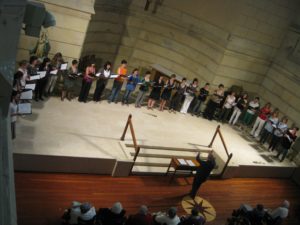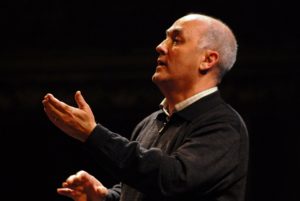By Cara Tasher, Choral Conductor and Teacher
Javier Busto, accomplished medical doctor, composer and conductor shared some ideas with me this May and to ensure our readership receives the most information, I have shortened my portion of the interview.
Cara Tasher (CT): “Three Basques make a choir” implies a singing culture. Tell us about your journey as a Basque musician.
Javier Busto (JB): Yes, it’s true, there is that saying about the Basques, our culture has been really identified with singing and I’ve experienced it since I was a kid. Ever since my childhood I have sung in choirs, and in my teenage years I joined diverse groups of rock and folk music. As a child, I had a brief and poor introduction to music education; it was when I was an adult that I turned into a self-taught musician. In my college years I took my first steps in directing choirs and I started to write my first songs for choirs. Throughout the years, I’ve founded and directed two choirs (Eskifaia Abesbatza and Kanta Cantemus Korua), with which I’ve received significant awards and recognition. I believe that my work as a teacher of choir directors, as well as my encouragement to young people to take up this trade, has been one of my contributions, both in choir direction and choir composition.
CT: It seems that the male chorus dominated in Basque music. What was your inspiration to found Kanta Cantemus Korua (KCK), a women’s chorus?
JB: By the end of the 19th century and in the early 20th, most of the Basque choirs consisted entirely of men. The main reason was that in churches women weren’t allowed to sing in the choir. Choirs commonly consisted of boys and men. During the 50s or 60s, women began being allowed to join choirs, although previous to this many male choirs had begun to turn into mixed choirs. For approximately 25 years, I directed mostly mixed choirs. In 1995, I decided to form the KCK because in my previous experience the discipline and commitment of women had been superior to those of men.

CT: Describe the repertoire you perform with your choirs outside of your own.
JB: I’d especially like to highlight my work as director of the Eskifaia Abesbatza from 1978 to 1994. With this choir, I mostly performed Basque music, but not exclusively. I also performed contemporary music written by great composers throughout the world, even performing choral-symphonic music such as Mahler’s Symphony No. 7, Orff’s Carmina Burana, Britten’s War Requiem, Fauré’s Requiem. In addition, I also performed a cappella contemporary music from composers such as Poulenc, Sven David Sandström, Vic Nees, Szokolay, Hugo Distler, Jean Berger, among others. With the KCK I had the opportunity to approach very complex repertoires as well, and the work turned out to be less difficult than with my previous mixed choir, given that the musical expertise of the female singers was so extensive. This allowed us to work with repertoires, which only such experienced singers could tackle. With this choir I mostly programmed my own compositions, but I also encouraged excellent composers such as Eva Ugaled, Junkal Guerrero, Idoia Azurmendi, among others, who are also singers of my choir, to begin writing choral music, which is now quite recognized in our country.
CT: Conductors appreciate your attentiveness to the translations to both Spanish and English in your publications since the Basque language is less familiar.
JB: The Basque language is something that belongs to a people so small in number that by all means we must work extremely hard to keep it alive. It’s a highly significant culture group and we can’t allow it to disappear without a trace. Owing to this, I’ve always written plenty of music in Basque, trying to ensure that through the Spanish and English translations choir directors and singers can understand the texts in the same way we, the Basques, can sing Brahms in German, in Russian, or Takemitsu in Japanese, among others. –Choirs of these countries must sing in the same way the music written in Euskara, thus achieving the objective that such a minority language–probably the oldest in Europe–won’t be lost.
CT: Hallmarks of Busto’s compositional style:
JB: My music has two fundamental roots: Rock and folk Basque music. Consciously or unconsciously I always work hard for these influences to appear in my music, specifically the Basque rhythms. I even try for them to appear in religious music. Yes, undoubtedly the Basque influence is always there in my music. In the same way, the harmony of rock and roll and bossa nova are always present too.
CT: It would be helpful to know more about the great Basque poets that you set in your non-sacred works such as José Angel Irigaray, Josune López, etc.
JB: In many of my compositions I’ve used poems from Basque poets like the ones you mentioned, which are friends of mine who have always provided me with phonetically remarkable texts. José Angel Irigaray and I share certain similarities since we are both doctors and his poetry, like my music, is very attached to the culture of our people. Over the last few years I’ve also been working with Spanish poetry (such as Pablo Neruda, Octavio Paz, Miguel Hernández, Federico García Lorca, among others), which is giving me new sources of musical inspiration. Josune López is a woman of great sensitivity and very kind in the expression of her feelings. She has been singing with me since she was 14 years old. Her mother, Lurdes Zubeldia, has also written much poetry in Basque and nowadays her daughter, Ane García, follows in her mother’s footsteps. I’ve used poems from all three of them for many of my songs. The last one, HEGAN, which is a poem by Ane, was premiered yesterday, May 20th, 2011. To this list I’d also add Inazio Mujika. I’ve used much of his texts for creating some of my more frequently performed repertoire such as “Sagastipean”, which is greatly acknowledged in the international choral world. I started writing songs from his poems through some publications of his in our local newspaper, “Diario Vasco”, of San Sebastián. Later in life I met him personally. Once, he wrote poems for young children, poems for teenagers and poems for adults, which allowed me to adapt the music for the kind of text he was proposing. He currently is a Basque literature publisher and continues to write.
CT: Life Journey as Medical Doctor and Conductor/Composer:
JB: Until I was 18 years old and I started studying Medicine, I was playing rock and roll music and a genre that in that time was called “hippie protest songs.” From the very moment I started attending my medicine studies, I started singing in the Coro Universitario de Valladolid and directing the choir of Estudiantes Vascos de Valladolid “EDERKI.” It was during that time that when I started writing music for the choir in a spontaneous way. I had no musical studies whatsoever. I started learning as I studied scores from other authors. It’s true that I worked hard and matched both activities, the professional one as a doctor –which is my livelihood- and the musical, up to this day.
CT: Regarding the future of Basque musical traditions:
JB: I believe Basque musical tradition on an orchestra level is guaranteed because the Basque Government makes very large investments on professional orchestras. This way, composers can continue writing Basque music. On a choral level, however, I have serious doubts. The overall level of choirs has dropped, especially because of the choice not to include choral singing in the schools of the Basque country. A tradition, which has granted us fame across the world for so many years, has now been pushed to the background. Our current choral level is quite irregular with the exceptions of the large choirs, which devote to symphonic choral music and a very few choirs which take their work seriously and have good singers in their ensembles.
CT: Self-inspired versus commissioned works:
JB: Usually I’ve written my works voluntarily, since I’ve considered that my knowledge on the voices always helped write music á la carte based on the possibilities of the choirs. That is to say, if I were to write for a choir whose tenor section didn’t perform very well, I always tried to make the tenor parts easier. I’ve written many songs for all kinds of choirs and usually choirs directed by friends for which I received no kind of payment. On the other hand, I’ve been asked to write works from many countries, and although many of these have not been yet published, in many cases owing to their difficulty level. I’m interested in any project that might benefit choirs. For instance, any music that has a certain level of complexity but that in time, with hard work, may be sung by mid-level choirs. My fundamental goal right now is to provide music that can be interpreted by many choirs, although now and then I write very complex music which can only be performed by high-level choirs. I’ve recently delivered some works that have been published by Carus Verlag in Germany. Right now I’m writing a play that will be included in song compilation book by diverse authors to raise funds for the victims of the Fukushima earthquake in Japan. Evidently, by transferring the rights of this edition for the Japanese people. In the years I’ll keep writing music since I have been asked both from Japan and Italy, which is enough work for the time being. In my life as a composer there have always been times were I haven’t written practically any play for one or two years. I don’t know what will happen in these next 10 years, but I do know that there will be new compositions by Javier Busto.
 Javier Busto was born in Hondarribia in the Basque Country of Spain in 1949. He graduated as a medical doctor from Valladolid University. Known internationally as a composer of music and as a choral conductor, he has presented his compositions at the Fourth World Symposium on Choral Music in Sydney Australia in 1996, and was guest conductor of the “Tokyo Cantat” in 2000. His choirs have won first place awards in France, Italy, Austria and Germany. Busto has served on the jury of composition and choral competitions in Spain, France, Italy and Japan. His compositions are published in Sweden, Germany, Spain and the United States.
Javier Busto was born in Hondarribia in the Basque Country of Spain in 1949. He graduated as a medical doctor from Valladolid University. Known internationally as a composer of music and as a choral conductor, he has presented his compositions at the Fourth World Symposium on Choral Music in Sydney Australia in 1996, and was guest conductor of the “Tokyo Cantat” in 2000. His choirs have won first place awards in France, Italy, Austria and Germany. Busto has served on the jury of composition and choral competitions in Spain, France, Italy and Japan. His compositions are published in Sweden, Germany, Spain and the United States.
Those interested in contributing to ICB Composer’s Corner to share relevant information with the community should contact Dr. Cara Tasher (University of North Florida in Jacksonville) at ctasher@gmail.com.


